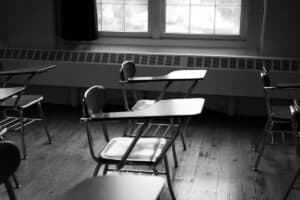Principals of the 70 schools have asked the Suid-Afrikaanse Onderwysersunie director of operations not to release the names of the institutions, fearing that it could cause panic.

A tragedy similar to the one at Hoërskool Driehoek is possible at 70 schools in South Africa, after they were red-flagged for structural defects.
On February 1, the country mourned the death of four pupils after a concrete slab above a corridor at Hoërskool Driehoek in Vanderbijlpark collapsed. Twenty-two pupils were injured and some of the injuries were severe injuries.
On Friday, the Suid-Afrikaanse Onderwysersunie (SAOU) released its national survey on school infrastructure where it identified 70 schools nationally as on the brink of collapse.
SAOU’s director of operations Johan Kruger said Hoërskool Driehoek was not among the 70 schools.
The majority were in Gauteng and Mpumalanga.
Kruger said principals of the 70 schools have asked him not to release the names of the institutions, fearing that it could cause panic.
“Last week, we visited another school in Gauteng where we found a block of classroom[s] with serious structural problems. The principal of the school then shut down the affected block. The principal also asked us not to reveal the identity of the school.
“The principal showed us letters of communication between the school and the department,” he said.
The survey was launched following the Hoërskool Driehoek tragedy.
“The SAOU launched a national survey to obtain a more informed picture of the degree of compliance with the regulations relating to Minimum Uniform Norms and Standards by the Public School Infrastructure.
“Hoërskool Roodepoort for example, is just one other instance where the school must operate without 18 classes due to the deteriorated condition of the building.
“Arising from the survey to date, the SAOU has identified more than 70 schools with infrastructure problems that can be categorised as requiring urgent and serious attention to parts of the buildings. Significantly, the average age of the schools that participated in this survey is 68 years,” he said.
Schools from Quintile 1 to 5 participated in the survey. Schools in the poorest communities are classified as Quintile 1 and schools serving the wealthiest communities are classified as Quintile 5.
Infrastructure that schools deemed to be very dangerous included roofs, corridors, staircases, serious cracks on walls, asbestos classes and sewage.
Kruger said 68.3% of the infrastructure problems were reported to the department and 31.7% of were not. And, 71.7% of the schools did not receive any feedback.
‘Don’t use learners as bargaining chip’
The average amount schools spent on maintenance of buildings over a period of three years was R986 559.15.
“The SAOU will monitor the situation closely and where possible, pay site visits to the affected schools in order to assist with the submission of complaints or requests for maintenance by the department,” he said.
City Press reported on Thursday that Gauteng MEC for Education, Panyaza Lesufi convened a meeting with student governing body associations, principals and learner leaders to discuss infrastructure maintenance and challenges in schools.
Spokesperson Steve Mabona said they had encountered several school shut downs after the Hoërskool Driehoek tragedy.
“Schools in some areas, including Tshwane, Kagiso and Roodepoort, were shut down by parents who demanded the MEC come and see them personally because they said the infrastructure of some schools in their respective areas was not safe,” he said.
Lesufi said schools in the province were becoming a death trap and if nothing was done, more tragedies would bring shame.
“We are aware that almost 190 schools are death traps and we as a collective need to work together to stop any more tragedies from happening at our schools,” he said.
Lesufi added that his department had secured a loan of R8.5m. His announcement was applauded.
“This was a decision we took together with Gauteng Premier David Makhura. By the year 2023, all mobile schools in the province will be history. In the next two years, all asbestos schools will fall and we will build new schools,” the MEC said.
“I will never meet with a school governing body or any crowd that shuts down a school because they want to meet with me. Don’t use learners as a bargaining chip. If there is a need to shut down a school, let’s all agree,” said Lesufi.
– News24
For more news your way, download The Citizen’s app for iOS and Android.






